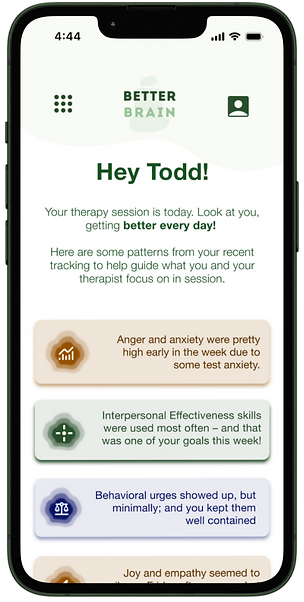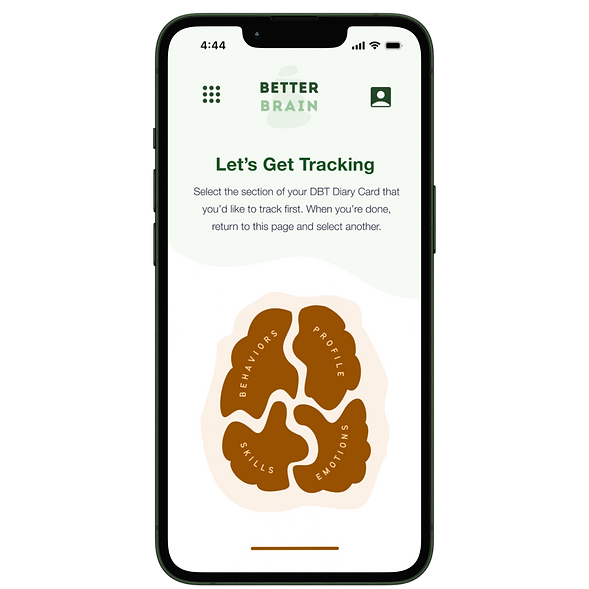
is the tool for managing your journey through Dialectical Behavioral Therapy (DBT)
A Case Study by Elizabeth Kupchella
Roles: UX Design | Product Design | UX Research | Back-End Development
Resources: Figma | Jira | Miro | Maze | Buzzy | Glide | XCode | FaceTime Calls From My Mom
Comprehensive View
Concise View
Condensed View
Obstacle
Opportunity
Approach
Dialectical Behavior Therapy (DBT) requires a client to manually track their emotions, the intensity of those emotions, their behaviors, and their theraputic skill use every day for a year.
Traditional paper diary cards can be easy to forget, and a digital diary card typically exists as a spreadsheet, more commonly referred to as The Last Thing You Want To See Before You Go To Bed by most pulse-having folks.
Both subpar options make it harder for clients to reflect, notice patterns, or bring meaningful insights into therapy.
A mobile-first DBT diary card app designed to simplify and encourage daily skill tracking. It allows users to log emotions, behaviors, and DBT skills quickly and intuitively, review skill definitions, and export data for use in therapy – all in one discreet, user-friendly tool.
Optional therapist-linked features support accountability and structured reflection.
The app was designed with a trauma-informed, accessibility-focused lens and draws heavily on direct DBT materials and peer-reviewed research.
I conducted a competitive analysis of mental health tracking tools, mapped user flows for key behaviors, and am prototyping screens in Figma where I'll test user flows with heat maps and Maze. The UI emphasizes calm and clear digital minimalism for daily use.
Dialectical Behavior Therapy (DBT) requires clients to track emotions, behaviors, and skills daily for a year, but paper diary cards are easy to forget, and digital ones (like spreadsheets) are cumbersome, hindering reflection and insight.
A mobile-first DBT diary app that simplifies and encourages daily tracking. It allows users to log emotions, behaviors, and DBT skills, review skill definitions, and export data for therapy— all in a discreet, user-friendly tool. Therapist-linked features can support accountability and reflection.
Designed with a trauma-informed, accessible focus, based on DBT materials and research. I’ve conducted a competitive analysis, mapped user flows, and am prototyping screens in Figma, using heat maps and Maze for user testing. The UI emphasizes calm, minimal design for daily use.
DBT requires daily tracking of emotions, behaviors, and skills, but paper and digital options are often forgettable or overly complex.
A mobile-first DBT diary app simplifies tracking and reflection, while supporting therapy with easy data export and optional therapist-linked features.
The app is designed with trauma-informed, accessible principles and informed by DBT research, with user testing via Figma and Maze.

Research
As someone making the transition into UX while balancing full-time and part-time work, I didn’t have the capacity to learn how to run a HIPAA-compliant, publish-ready research study for this project. Here's how I approached UXR instead:
-
I studied UX research trends to ground myself in current practices.
-
I familiarized myself with UXR tools like Miro, Jira, Ethnio, dscout, and Lookback to build fluency for future collaboration with research teams.
-
I created proto-personas based on secondary research, DBT literature, and design assumptions, helping me clarify user needs and guide early design decisions until usability testing could validate or challenge them.
I’m excited to grow my skills by partnering with UXR teams in the future. For now, the following research methods represent my best effort to bridge research insights with design practice in a realistic and responsible way.
Secondary Research
Assessment of current diary card options (paper, spreadsheets, and limited apps) revealed key findings:
-
Higher engagement on mobile: Mobile apps increase adherence by integrating seamlessly into daily phone use, boosting tracking consistency.
-
Real-time symptom reporting: Digital cards enable immediate logging and secure sharing with therapists, improving therapy alignment and timely intervention (Miller et al., 2023).
-
Supports skill generalization: Mobile tools offer just-in-time coaching and prompts, helping users apply DBT in daily life.
-
Improved treatment compliance: App users logged 37 more treatment days and 3 more skills per week, indicating better long-term adherence.
Competitive Analysis
The DBT app landscape splits between rich but expensive learning platforms like DBT Coach (skills videos, clinician portal) and lightweight trackers like DBT Diary Card & Skills Coach, Simple DBT Skills Diary Card, and Impulse DBT (cheap, but limited export and therapist integration). Users “hire” these tools for either logging or learning, but they rarely blend daily practice into therapy sessions.
BetterBrain differentiates from competitors by focusing on that bridge: daily logs with context, built-in phone coaching templates, homework reminders, and therapist-ready exports, making it more session-oriented and client-therapist aligned.
BetterBrain leans into creative UI with new app features such as a skills match quiz, where users are able to input how they're feeling and how they want to feel instead, and are then given a corresponding skill to match; suggested session agenda based on spikes in emotional intensity throughout the week, and more.
BetterBrain is also the only DBT app that supports DBT pre-treatment and Stage 3 treatment after a client has completed the 12-month full protocol program.
Proto-Persona: Primary User

Sasha Ramirez, DBT Patient
Age: 27
Race: Latina (Hispanic)
Education Level: Some college coursework toward a Bachelor’s (currently enrolled)
Languages Spoken: English, Spanish
Family Status: Single; lives with a supportive roommate; limited close family nearby
Occupation: Student
“I want something that reminds me gently to check in, helps me stick to my skills without feeling like a chore, and doesn’t vanish when I most need support.”
Frustrations
Paper + Spreadsheet Diary Cards
When I try to use a paper diary card, I honestly tend to lose it. When I use the Sheets app on my phone, it feels clunky, impersonal, and time-consuming to fill in during emotional distress.
Other Apps Aren't Tailored Enough
Most DBT apps just track moods, feel clunky or clinical, and cost too much. None make it easy to reach my therapist or get reminders when I actually need my skills.
Goals
A Diary Card That Moves With Me
Short, easy exercises and therapist touch points I can pull up fast when I need them the most, like a mindfulness tip, a skill refresher, or even a phone coaching session.
One Place for All Things DBT
Managing a personal journal, spreadsheet diary card, and workbook is overwhelming, so I wanted one place that functions as a diary card, tracks progress over time, supports homework, and captures reflection.
Sasha is introspective and emotionally intense—driven to grow, but often overwhelmed. Creative and empathetic, she’s quick to laugh yet struggles with self-criticism and fear of abandonment, reflecting many DBT and BPD patients. Her emotional intensity, fear of abandonment, and difficulty regulating moods are core features of BPD, and in clinical settings, about 75 % of diagnosed BPD patients are women, often in their 20s to early 30s, according to the National Library of Medicine.
Proto-Persona: Secondary User

Dr. Anika Deshpande, LCSW
Age: 38
Race: South Asian American
Education: Master of Social Work (MSW), plus post-graduate DBT certification
Languages: English, conversational Gujarati
Family Status: Married with one preschool-aged child
Occupation: Licensed Clinical Social Worker (LCSW), coordinator and co-leader of a full-protocol DBT program in a community mental health center
“I need a tool that gives me clear insight into my client’s week before we even meet so we can spend our session working on emotion regulation, not hunting for data about it"
Frustrations
Patient Engagement + Spreadsheets Don't Mix
Asking a client to commit to three hours of therapy each week in addition to homework and daily logging is a lot, and spreadsheet logs clearly fall to the back burner. Clients usually have to complete the diary card in session because they just couldn't get to it, cutting into valuable therapy time.
Other Apps Lack In-Session Support
Available DBT apps seem to only focus on tracking emotions and behaviors; current options don't seem to be a comprehensive resource for all the other parts of DBT (and there are tons), like skill overviews and homework reminders.
Goals
Insight Ahead of Session
Quickly view and interpret a client’s recent diary-card trends (e.g., skill use, urges, behaviors, emotions) before the start of session to better prepare our session agenda and areas of focus.
Client Empowerment
There are so many components to full-protocol DBT, and they all seem to be disconnected; I want my clients to feel like they have a home base for their journey through the program, so they can feel empowered when they see progress.
Anika is warm, organized, and deeply committed to her clients’ growth. She also reflects the typical mental health practitioner: most clinicians (70-75%) are women, often in their 30s–40s. I chose a South Asian background to avoid defaulting to the “white, mid-30s female therapist” archetype. While most U.S. providers are White (around 80%), Asian and South Asian representation is growing, especially in urban and community health settings; making her Indian American both realistic and inclusive.
Primary Task Flow Journey Map
WTF?
(why this flow?)
It's the crux of the diary card: tracking. It happens daily, and any DBT app will likely be built around this flow; when this flow works, the DBT app works.
The image below is just an overview – click it to open a new window where you're free to zoom in on each chart component.
Iteration Spotlight: Trends + Summaries
The design decisions with Better Brain aren't just about adding; they're about removing, too.
It's not a common portfolio component – but I want to walk you through one of my personal favorite design iterations in this app: rethinking how and when users receive summaries of their entries.
Early designs asked users to opt into summaries on each individual tracking screen like this:
User completes tracking section
User is prompted to save that day's info
Confirmation screen
Before

After Iteration
This series repeated after every completed tracking screen for each and every day –– it was way too much.
So, through testing and reflection, especially realizing in my journey map that users of a mental health app are dealing with psychological barriers to action before they're even introduced to an interface, I realized I created unnecessary steps when they least want to be on their screens.
So, instead, I shifted from multiple decision points to a single pop-up notification timed to appear the morning of a user's therapy session:

Secondary Task Flow Journey Map
WTF?
(why this flow?)
I wanted to include the skills match quiz in my case study because it's an original idea (in the context of DBT apps) showcasing a unique and thoughtful approach to problem-solving.
The image below is just also just an overview – click it to open a new window where you're free to zoom in on each chart component.
Secondary Task Flow Visualizer
This flow helps users quickly translate emotional distress into targeted skill use. By mapping “how I feel” to “how I want to feel,” the quiz recommends a DBT skill in seconds — reducing overwhelm and supporting real-time regulation.
.png)
.png)

UI Highlight: the contouring of each menu item was individually designed to look like sections of a brain, a really informative and difficult exercise in building a better UI skillset. The Blob Generator plugin is a Figma widget created by @k_kurakoa




Outcomes + Reflections
My biggest design assumption about starting the process for BetterBrain is that it would be a task in data collection, but mental health tools are a unique space; they aren't about collecting more data as much as they are about helping people make sense of the data they already have.

